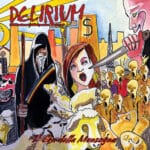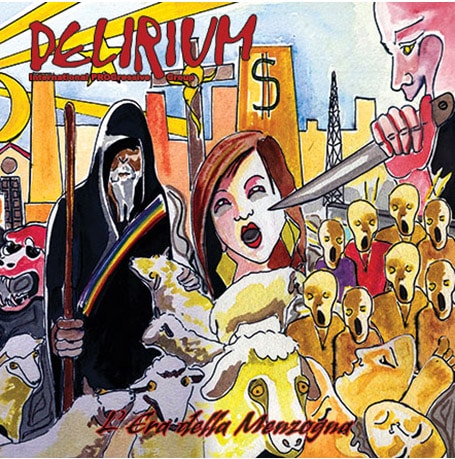Delirium came from Genova, from a previous beat band called I Sagittari, and formed in 1970, releasing their first single a year later.
First album, Dolce acqua, also from 1971 contains a good and original mix of prog, jazz and some tuneful melodies, the leading role of singer Ivano Fossati is evident, with his furious flute soloing being one of the band’s most distinctive elements. The album, housed in a nice triple gatefold cover, is structured in various movements like a classical suite, but here and there some parts seem a little incoherent with the whole LP. It was not a great success, as demonstrated by the fact that no less than three tracks from it appeared on singles a year later.
Around mid-1972 Ivano Fossati suddenly had to leave the group for his military service, later to pursue a solo career that’s still successful today, even with a lighter (but always full of jazzy and ethnic influences) kind of music. His replacement was englishman Martin Frederick Grice (from Boomerang) who, along with the ever present flute, was also a brilliant sax player.
Second album Lo scemo e il villaggio still has some jazz influences and a stronger use of sax by the new member Grice, with the evident lack of a role singer in the band, all members taking the lead singer role. The track La mia pazzia is the closest to first album’s style.
Third album follows in 1974, called Delirium III (Viaggio negli arcipelaghi del tempo) and judged by many as their most mature work. La battaglia degli eterni piani contains a dark-inspired atmosphere never heard in their previous releases, the flute has again a prominent role and the sax is only present in Viaggio n.2. This is also the first album to feature electric guitar, as Mimmo Di Martino only played the acoustic in previous albums.
At the beginning of 2007 the new line-up featuring original members Ettore Vigo, Peppino Di Santo and Martin Grice and newcomers Roberto Solinas (vocals, acoustic and electric guitars) and Fabio Chighini (bass, vocals) has released the Live-Vibrazioni notturne CD, also as 2-LP set, for the Black Widow label, a great return for this excellent Italian prog group. The record contains tracks from the LP’s and some singles made by the group, along with a new cut, Notte a Baghdad, and 2 covers, and shows the great form of the revamped Delirium.
In 2009 the fourth studio album in the story of Delirium was released, Il nome del vento, released with help from various guest musicians including their original guitarist Mimmo Di Martino, while the live line-up includes once again the multi-instrumentalist Rino Dimopoli.
The album, including brand new compositions with the exception of excerpts from Van Der Graaf Generator’s Theme one and Dio del silenzio from Delirium III, is well played and a pleasant listen, being mainly based on not particularly heavy sounds.
The long career of Delirium was finally celebrated in 2010 with the release of a nice retrospective DVD, Il viaggio continua: La storia 1970-2010, which includes a live-gig in Genoa from 2008 (also on the bonus CD) and the complete series of RAI TV clips made between 1971 and 1975.
In 2014 Alessandro Corvaglia (Maschera di Cera, Real Dream) join the band on vocals together with Michele Cusato on Electric Guitars and Alfredo Vandresi (Alberto Radius Band) on drums. Line-up is now complete with the original members Ettore Vigo (keyboards), Martin Grice (Flute, Saxophone) and Fabio Chighini on Bass Guitar.
With this new explosive line-up DELIRIUM – International PROGressive Group recorded this new album “L’Era della Menzogna”, presented for the first time at PROG SUD in Marseille.
TRACK LIST:
L’INGANNO DEL POTERE
IL NODO
L’ANGELO DEL FANGO
FUORILEGGE
LA DERIVA
L’ERA DELLA MENZOGNA
LA VOCE DELL’ANIMA
BASTA
IL CASTELLO DEL MAGO MERLINO (Come un Tempo)
Alessandro Corvaglia: Vocals
Ettore Vigo: Keyboards
Martin Grice: Saxophone, Flute
Fabio Chighini: Bass Guitar
Alfredo Vandresi: Drums
Michele Cusato: Electric Guitar




